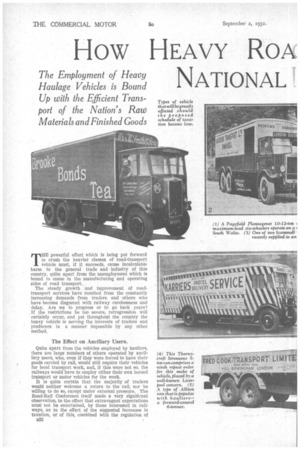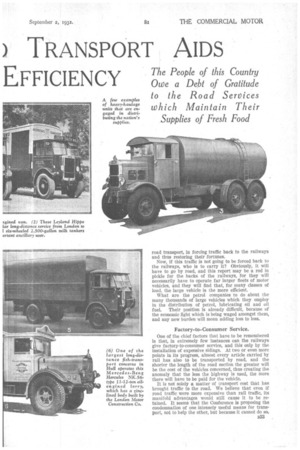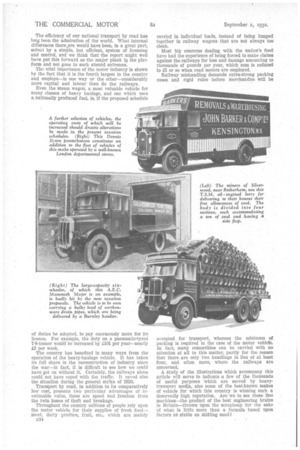How HEAVY ROA
Page 50

Page 51

Page 52

If you've noticed an error in this article please click here to report it so we can fix it.
) TRANSPORT AIDS
NATIONAL
EFFICIENCY
The Employment of Heavy Haulage Vehicles is Bound Up with the Efficient Transport of the Nation's Raw Materials and Finished Goods The People of this Country Owe a Debt of Gratitude to the Road Services which Maintain Their Supplies of Fresh Food
THE powerful effort which is being put forward to crush the heavier classes of road-transport vehicle must, if it succeeds, cause incalculable harm to the general trade and industry of this country, quite apart from the unemployment which is bound to ensue in the manufacturing and operating sides of road transport.
The steady growth and improvement of road transport services hare resulted from the constantly increasing demands from traders and others who have become disgusted with railway carelessness and delay. Are we to progress or to go back years? If the restrictions be too severe, retrogression will certainly occur, and yet throughout the country the heavy vehicle is serving the interests of traders and producers in a manner impossible by any other method,
The Effect on Ancillary Users.
Quite apart from the vehicles employed by hauliers, there are large numbers of others operated by ancillary users, who, even if they were forced to have their goods carried by rail, would still require their vehicles for local transport work, and, if this were not so, the railways would have to employ either their own horsed transport or motor vehicles for the work.
It is quite certain that the majority of traders would neither welcome a return to the rail, nor be willing to do so, except under external pressure. The Road-Rail Conference itself made a very significant observation, to the effect that extravagant expectations must not be entertained, by those interested in railways, as to the effect of the suggested increases in taxation, or of this, combined with the regulation of B32 road transport, in forcing traffic back to the railways and thus restoring their fortunes.
Now, if this traffic is not going to be forced back to the railways, who is to carry it? Obviously, it will have to go by road, and this report may be a rod in pickle for the backs of the railways, for they will necessarily have to operate far larger fleets of motor vehicles, and they will find that, for many classes of load, the large vehicle is the more efficient.
What are the petrol companies to do about the many thousands of large vehicles which they employ in the distribution of petrol, lubricating oil and oil
fuel. Their position is already difficult, because of the economic fight which is being waged amongst them, and any new burden will mean adding loss to loss.
Factory-toConsumer Service.
One of the chief factors that have to be remembered is that, in extremely few 'instances can the railways give factory-to-consumer service, and this only by the installation of expensive sidings. At two or even more points in its progress, almost every article carried by rail has also to be transported by road, and the shorter the length of the road section the greater will be the cost of the vehicles concerned, thus creating the anomaly that the less the highway is used, the more there will have to be paid for the vehicle.
It is not solely a matter of transport cost that has brought traffic to the road. We believe that even if road traffic were more expensive than rail traffic, its manifold advantages would still cause it to be retained. It seems that the Conference is proposing the condemnation of one intensely useful means for transport, not to help the other, but because it cannot do so.
The efficiency of our national transport by road has long been the admiration of the world. What internal differences there are would have been, in a great part, solved by a simple, but efficient, system of licensing and control, and we think that the report might well have put this forward as the major plank in the platform and not gone to such absurd extremes.
The vital importance of the motor industry is shown by the fact that it is the fourth largest in the country and employs—in one way or the other—considerably more capital and labour than do the railways. Even the steam wagon, a most valuable vehicle for many classes of heavy haulage, and one which uses a nationally produced fuel, is, if the proposed schedule
of duties be adopted, to pay enormously more for its licence. For example, the duty on a pneumatic-tyred 7-8-tonner would be increased by .£101 per year—nearly £2 per week.
The country has benefited in many ways from the operation of the heavy-haulage vehicle. It has taken its full share in the reconstruction of industry since the war—in fact, it is difficult to see how we could have got on without it. Certainly, the railways alone could not have coped with the traffic. It saved also the situation during the general strike of 1926.
Transport by road, in addition, to its comparatively low cost, presents two particular advantages of inestimable value, these are speed and freedom from the twin losses of theft and breakage.•
Throughout the country millions of people rely upon the motor vehicle for their supplies of fresh ,food— meat, dairy produce, fruit, etc., which are mainly n34 carried in individual loads, instead of being lumped together in railway wagons that are not always too clean.
Most big concerns dealing with the nation's food have had the experience of being forced to make claims against the railways for loss and damage amounting to thousands of pounds per year, which sum is reduced to f5 or so when road motors are employed.
Railway mishandling demands extra-strong packing cases and rigid rules before merchandise will be accepted for transport, whereas the minimum of packing is required in the case of the motor vehicle. In fact, many comestibles can be carried with no attention at all to this matter, partly for the reason that there are only two handlings in lieu of at least four, and often more, where the railways are concerned,
A study of the illustrations which accompany this article will serve to indicate a few of the thousands of useful purposes which are served by heavytransport media, also some of the best-known makes of vehicle for which this country is winning such a deservedly high reputation. Are we to see these fine machines—the product of the best engineering brains in Britain—thrown upon the scrapheap for• the sake of what is little more than a formula based upon factors as stable as shifting sand?




































































































